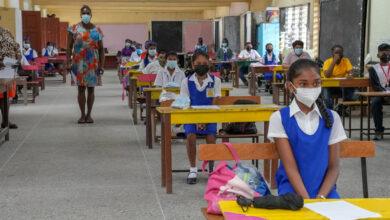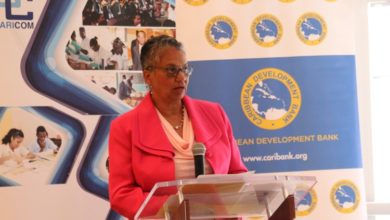(CARICOM Secretariat, Turkeyen, Greater Georgetown, Guyana) Tertiary institutions in Member States of the Caribbean Community (CARICOM) will be brought into the fold of distance and e-learning via the Caribbean Knowledge and Learning Network (CKLN) through the financial assistance of the European Union (EU).
On Wednesday 3 May, CARICOM Secretary-General and Secretary-General of the Caribbean Forum of ACP States (CARIFORUM), H.E. Edwin Carrington signed a Financing Agreement with the European Commission Delegate to Guyana H.E Per Eklund, in the amount of Euros 2M. The grant funds will facilitate the provision of affordable distance education for CARICOM nationals.
Speaking at the signing ceremony, Secretary-General Carrington said the CKLN represented a major step in “addressing and solving the problems of connectivity in and outside the Region and access to quality education by all CARICOM Citizens.” He noted that quality education was also critical to the development of the CARICOM Single Market and Economy (CSME), the Caribbean’s attainment of the Millennium Development Goals (MDGs), and the building and sustaining of a Caribbean information society.
In his remarks, Ambassador Eklund said, “the Caribbean, like many other regions, has to educate and to keep its human resource base, as well as to attract trained nationals back, if it is to develop economically and to have a trained, competitive labour force. It needs this to enable it to face the challenges of the 21st century and to be able to react to the dynamics of the global knowledge economy. The CKLN, for which we are hereby granting €2M, is in this context an extremely important Institution.”
The CKLN was launched in 2004 at the CARICOM Heads of Government Meeting in Grenada by Dr. the Hon Keith Mitchell, Prime Minister of Grenada and CARICOM Head of Government with responsibility for Science and Technology.
The main objectives of the CKLN are to enhance the competitiveness and productivity of the Region’s labour force by developing human capacity to access and utilise affordable Information and Communication Technologies (ICTs). Additionally, the project will address the need to upgrade and diversify the skills and knowledge of the Caribbean people by improving the technical environment and ability of institutions to deliver cost-efficient and effective ICT-based education and training. Thirdly, the project is designed to significantly enhance the region’s ability to access international communication networks cost effectively. In addition to working with tertiary institutions across the Region, the CKLN offers further education opportunities to underserved communities: adults who work fulltime, women at home in charge of their families, and the populations of small island states– people who have little or no access to tertiary education facilities.
Activities completed under the project to date include institutional strengthening of eleven (11) tertiary institutions in nine (9) Member States, a labour market survey, policy workshops and the training of key personnel in the Education sector.






